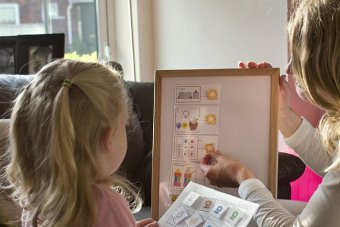
A report into autism diagnosis in Australia has found discrepancies in how children are assessed for the condition and calls for a national standard to ensure early intervention.
The study was produced through the Cooperative Research Centre for Living with Autism.
The senior author of the report, Professor Andrew Whitehouse from Perth's Telethon Kids Institute, said the study highlighted serious problems.
"It's clear that one child can go to a diagnostic team in Queensland and get a diagnosis of autism, cross state boundaries and not get a diagnosis," he told 720 ABC Perth.
"It leads to horrible inequity and doesn't give kids the best start in life."
Parents not 'doctor shopping'
The report suggested parents concerned about their children might be visiting multiple doctors in search of a diagnosis, but Professor Whitehouse rejected the term "doctor shopping".
"Autism does attract access to services," he said.
"If you have a child that is developing differently and a diagnosis of autism would help get access to services, it would be a rare parent who wouldn't seek to do that.
"We are seeing diagnostic teams that are giving a diagnosis of autism where it is not warranted.
"And also seeing kids that clearly have autism but are not being giving the diagnosis."
National standards needed
Professor Whitehouse said the solution rested in creating national minimum standards for autism diagnosis and a system that supported children with developmental delays.
He said he hoped the rollout of the National Disability Insurance Scheme (NDIS) would provide the impetus for national standards.
"The great thing about the NDIS is that it actually appraises a child on their level of difficulty rather than the diagnosis," he said.
"Now is the time to actually bring in these national standards and that will actually help the sustainability of the NDIS in the future."
WA leading the way in autism diagnosis
Professor Whitehouse said the most rigorous standards had been pioneered in Western Australia and that framework should be rolled out to other states.
Joan McKenna-Kerr, chief executive of Autism WA, agreed the diagnostic process was crucial for families.
"At the moment it is a muddle for families," she said.
"Autism diagnosis is critically important for this particular population because that label gives the best way to manage and help these children develop."
Ms McKenna-Kerr said rather than parents "shopping around" for a diagnosis, parents were simply seeking a second opinion.
"I have yet to come across a parent who wouldn't prefer their son or daughter not to have that diagnosis," she said.
"In any other area of clinical practice it's called getting a second opinion."
Autism diagnosis taking years
A mother who contacted 720 ABC Perth said she had sought help for her son when he was two but did not receive a diagnosis until he was 11.
"Getting a diagnosis is expensive, both in time and money," she wrote.
"It gives us access to targeted therapies though.
"I can only imagine how much better his life would be now if he had been diagnosed when I first sought help."
from http://www.abc.net.au/news/2016-04-27/r…;
Editor: the report can be downloaded from http://www.autismcrc.com.au/reports/dia…;
see also:
| Attachment | Size |
|---|---|
| Autism CRC Report - Diagnostic Standards for Autism.pdf (1.25 MB) | 1.25 MB |